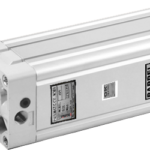Pneumatic cylinders are essential components in modern industrial applications, driving efficiency, precision, and reliability across a wide range of operations. These devices, powered by compressed air, convert energy into mechanical motion, making them a cornerstone in industries like manufacturing, automotive, packaging, and more. In this guide, we’ll explore the types of pneumatic cylinders, their advantages, key applications, and tips for selecting the right one for your industrial needs.
What Are Pneumatic Cylinders?
Pneumatic cylinders, also known as air cylinders, are mechanical devices that use compressed air to generate linear or rotary motion. They are widely used in automation systems to move, lift, or position objects with remarkable precision and speed. The compressed air pushes a piston within the cylinder, creating force that drives the desired motion.
Types of Pneumatic Cylinders
1. Single-Acting Cylinders
These cylinders use compressed air to push the piston in one direction, while an internal spring returns it to the original position. They are ideal for applications requiring simple linear motion.
2. Double-Acting Cylinders
Double-acting cylinders use air pressure for both extension and retraction, providing greater control and efficiency in motion.
3. Telescopic Cylinders
These cylinders are designed for applications requiring long strokes in a limited space. They consist of multiple stages that extend sequentially.
4. Rodless Cylinders
Rodless cylinders offer linear motion without an external rod, making them suitable for space-constrained applications.
5. Rotary Cylinders
These cylinders are used for rotational motion instead of linear movement, commonly found in assembly lines and turning mechanisms.
Advantages of Pneumatic Cylinders
-
High Speed and Precision: Pneumatic cylinders operate at high speeds with minimal delay.
-
Cost-Effective: They are more affordable than hydraulic or electric actuators.
-
Safe Operation: Compressed air is non-hazardous and environmentally friendly.
-
Low Maintenance: With fewer moving parts, pneumatic cylinders require minimal maintenance.
-
Energy Efficiency: Compressed air can be stored for future use, reducing energy waste.
Key Industrial Applications of Pneumatic Cylinders
-
Manufacturing: Assembly lines, pressing machines, and conveyor systems.
-
Automotive: Door control systems, braking systems, and robotic arms.
-
Packaging: Sealing, capping, and labeling machines.
-
Food and Beverage: Sorting, dispensing, and filling operations.
-
Material Handling: Lifting, positioning, and transporting goods.
Choosing the Right Pneumatic Cylinder
When selecting a pneumatic cylinder, consider the following factors:
-
Application Requirements: Determine the force, stroke length, and operating speed needed.
-
Cylinder Type: Choose single-acting, double-acting, or rodless based on your application.
-
Material: Stainless steel cylinders are ideal for corrosive environments.
-
Mounting Options: Ensure the mounting style suits your setup.
-
Sealing Mechanism: Choose appropriate seals for temperature and pressure conditions.
Maintenance Tips for Pneumatic Cylinders
-
Regularly inspect for leaks and damage.
-
Ensure proper lubrication to reduce friction.
-
Clean air filters to maintain air quality.
-
Replace worn-out seals promptly.
-
Follow manufacturer guidelines for service intervals.
Future Trends in Pneumatic Cylinders
As industries adopt smart manufacturing technologies, pneumatic cylinders are also evolving. Integration with IoT, advanced sensors, and automated control systems enhances their efficiency and monitoring capabilities. Smart cylinders can provide real-time feedback, predictive maintenance alerts, and performance optimization.
Conclusion
Pneumatic cylinders are indispensable in industrial applications, offering reliable, cost-effective, and efficient solutions for motion control tasks. By understanding their types, benefits, and maintenance practices, industries can maximize performance and minimize downtime. Investing in high-quality pneumatic cylinders ensures operational efficiency and long-term success in any industrial setup.
For expert guidance and premium-quality pneumatic cylinders, consult with trusted suppliers who understand your specific industrial needs.


